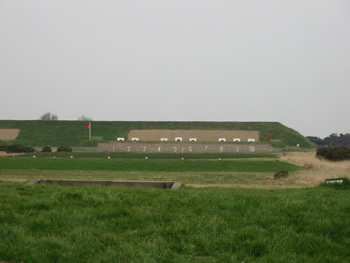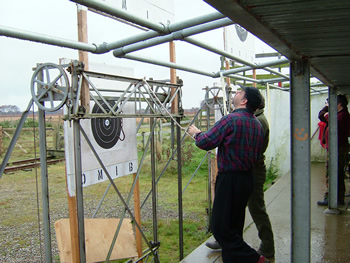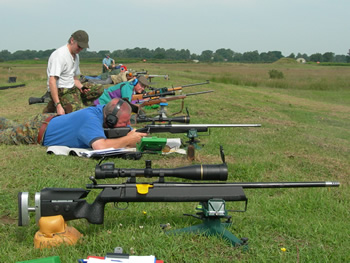

 Hull Rifle Club was founded in 1900 and progressed well, until by 1910 it was thriving with nearly 100 members. Most of the club shooting took place on Rolston ranges near Hornsea on the east coast shooting out to sea. At these times the range extended out to 600 yards and practice sessions took place on alternate Saturdays and Thursdays with competitions shot on Sundays. The club actively shot against other clubs in the area competing at ranges at Sheffield, Strensall Rolston and Catterick as well as regular trips to Bisley. In 1910 the club made its first voluntary donation of £1.1s.0d to the Yorkshire Rifle Association to help towards the cost of prizes for the Civilian Rifle Club Championships. At this time membership fees were 10 shillings per year. By 1913 the club was actively shooting at Bisley and at least 8 members had made it to the final of the King's Prize. Mr E K Brown a club member was also shooting for the England team.
Hull Rifle Club was founded in 1900 and progressed well, until by 1910 it was thriving with nearly 100 members. Most of the club shooting took place on Rolston ranges near Hornsea on the east coast shooting out to sea. At these times the range extended out to 600 yards and practice sessions took place on alternate Saturdays and Thursdays with competitions shot on Sundays. The club actively shot against other clubs in the area competing at ranges at Sheffield, Strensall Rolston and Catterick as well as regular trips to Bisley. In 1910 the club made its first voluntary donation of £1.1s.0d to the Yorkshire Rifle Association to help towards the cost of prizes for the Civilian Rifle Club Championships. At this time membership fees were 10 shillings per year. By 1913 the club was actively shooting at Bisley and at least 8 members had made it to the final of the King's Prize. Mr E K Brown a club member was also shooting for the England team.
 With the outbreak of the Great War on 13th March 1914 the club ceased to shoot until the war was over in 1918. The club was reformed at a meeting on 15th March 1921 with 15 members present and vowed to carry on and pay tribute to the members who had made the ultimate sacrifice for their country. It is recorded in the minutes of a meeting in 1922 that the railway companies were making available through the NRA cheap rail travel for rifle club members to travel to Bisley. In this post war time the lack of members was always a concern and attempts were made to recruit from local miniature rifle clubs. The club at this time was paying £12.10.0 per annum for the use of Rolston Ranges, the minutes record that the NRA was making available rifles for hire to club members for the cost of £1.00.0 per year. In 1925 the Chief Constable of the East Riding of Yorkshire was elected in to the post of Vice President of the club. Shooting continued unabated until the outbreak of the Second World War in September 1939. The club ceased to shoot until the end of the war and was again resurrected on 30th April 1945.
With the outbreak of the Great War on 13th March 1914 the club ceased to shoot until the war was over in 1918. The club was reformed at a meeting on 15th March 1921 with 15 members present and vowed to carry on and pay tribute to the members who had made the ultimate sacrifice for their country. It is recorded in the minutes of a meeting in 1922 that the railway companies were making available through the NRA cheap rail travel for rifle club members to travel to Bisley. In this post war time the lack of members was always a concern and attempts were made to recruit from local miniature rifle clubs. The club at this time was paying £12.10.0 per annum for the use of Rolston Ranges, the minutes record that the NRA was making available rifles for hire to club members for the cost of £1.00.0 per year. In 1925 the Chief Constable of the East Riding of Yorkshire was elected in to the post of Vice President of the club. Shooting continued unabated until the outbreak of the Second World War in September 1939. The club ceased to shoot until the end of the war and was again resurrected on 30th April 1945.
 The war had generated a greater interest and value in the art of rifleman ship and resulted in a increase in membership. Again the members of the club enjoyed success at Bisley and shot extensively at local ranges. This continued up to 1971 when dwindling membership and greatly reduced range allocation at Rolston the club went into caretaker ship. It remained mothballed until 1991 when it was reformed and moved its main shooting venue to Strensall ranges near York where it continues today.
The war had generated a greater interest and value in the art of rifleman ship and resulted in a increase in membership. Again the members of the club enjoyed success at Bisley and shot extensively at local ranges. This continued up to 1971 when dwindling membership and greatly reduced range allocation at Rolston the club went into caretaker ship. It remained mothballed until 1991 when it was reformed and moved its main shooting venue to Strensall ranges near York where it continues today.
A strong history and dedication by past members some of whom gave their lives to help secure a free and democratic country is our heritage. A heritage we are proud to continue and carry forward for hopefully many years to come.